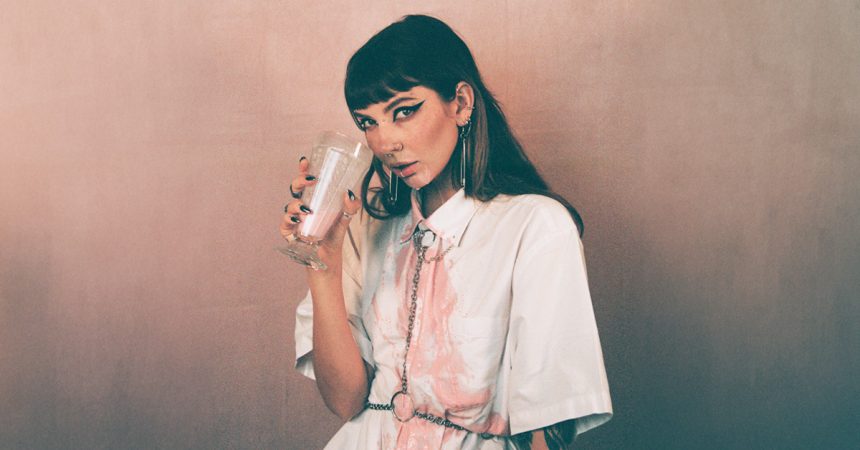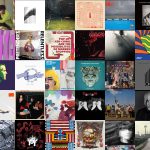KiNG MALA appears in our Winter 2023 Issue with cover stars Green Day, 070 Shake, Militarie Gun, and Arlo Parks. Head to the AP Shop to grab a copy.
Every snarling and teeth-gnashing performer finds inspiration from the fantastical world of their alter ego. For KiNG MALA, the Los Angeles-based alternative-pop artist, born Areli Castro, whose name translates roughly to “king bad bitch,” the world she’s created is one of absolute mutiny. Her curated persona is the overseeing cult leader who defies the rules of gender, holds space with unbounded fearlessness, and sparks confidence in those who listen.
However, the El Paso-born musician uses the character of KiNG MALA as more than a spicy moniker for her bewitching indie-pop music. It’s gold-plated armor in an uncertain world — and even a reminder of her own confidence and strength.
Read more: 50 best albums of 2023
Her latest project, SPILT MILK, the third and latest EP which dropped in November, spins her signature cheeky lyrics and clever songwriting into danceable tracks. With masculine tropes, defiant lyricism, and villainous outrage, the eight-track EP is a testament to a young artist who has finally found her sound after years of experimentation. From the sassy, staccato “bug” to the spin-chilling focus of “i only smoke to feel bad,” KiNG MALA has entered a new chapter in her already-meteoric career, one where vulnerability pulses louder than kicking and stomping.
When did you discover your love for music?
I’m from El Paso, Texas. My dad listened to music 24/7. Biggie, Tupac, ICP, classical music. I listened to a lot of soul and blues. I just found it on the internet in the early days of streaming. I would watch lyric videos on YouTube all day. I listened to a lot of Ray Charles, Sam Cooke, Etta James, and Aretha Franklin. That was my shit. But nobody else’s, so it was just me in my room.
Was there a music scene that you found in Texas?
My mom bought me a piano, like a little shitty upright piano from Craigslist, when I was 14. I started writing songs really seriously from then on, and I would perform at wine bars and coffee shops, anywhere that would take me. I got a fake ID so I could play at bars. Getting that piano was pivotal. But I never had friends with the same music taste. I was a sequestered musical person. I didn’t go to shows till I moved to LA.
Tell me about your move to LA. It seems like that’s when your career really started taking off.
I was freshly 18, just out of high school. I went to a music school out here for a little bit. Really I was just hardcore focused on leaving my hometown. I had to get out. So for that reason, it definitely kick-started everything. But it took a long time for me to figure out exactly what I wanted to do and what I wanted my life and music to even look like. I was so terrified of the world and freaked out by being an adult.
It was meeting my producer up here — we played a show together in 2019 and started writing and making music together after that — that I was like, “This makes sense. This is the name. This is the sound.”
How did you come up with your name, and what does it embody?
I knew I wanted aesthetically there to be a lot of masculinity. Suits, masculine silhouettes, bold colors. So I wanted to go with “King.” Then “Mala” means “bad woman” in Spanish. A little bad bitch energy. I wanted something that felt like an alter ego. Something [where] I felt cool and removed from who I am as a person because I’m a bit shy and dorky, and not necessarily the most badass person. I want something that makes me feel like how I want the music to sound.
There’s a very mischievous undertone to your music. Do you identify with being a troublemaker or provocateur?
I was a very rebellious teenager. I wanted to be the one in all black with blue hair and piercings in a community that was hardcore Christian and super Southern. In that sense, I do want to be the bad guy. But at the same time, I don’t want to make people upset. I don’t want to fight. I’m nonconfrontational. I consider myself [to be] a very peaceful and easygoing person. So in that way, I don’t relate to the character necessarily. The character is an embodiment of confidence, which sometimes I feel very connected to and sometimes I feel very disconnected to. But it’s always there for me, which is helpful.
What topics influence your songwriting?
For some reason, I’m always angry at men, which I think is fair. There are a lot of systemic things that I feel particularly angry about that I like to write about, like the patriarchy. Feeling like I need to be in a certain role as a woman. Feeling like I need to be a certain kind of person to be cool or edgy. I get mad when people tell me what to do. And I love writing about being angry.
I accidentally wrote a couple songs that were very empowering for people. That was the response that I got from them. So I try to lean into that because it’s so incredible to see people come to you and be like, “Your song makes me feel really cool. And when I’m scared, I listen to it so that I can be brave.” That means so much to me, because I understand that. I am that person as well, and I need that, too.
You’re now in your SPILT MILK era. What does this project mean to you?
All the songs are very personal, and I hate the word “whiny,” but that’s kind of what it is. It’s the first time that it’s my true voice and how I [actually] feel. It’s the closest to Areli versus KiNG MALA, which I really like. It’s sweet and vulnerable and angry. It’s emotional as fuck, which I feel like is a side that I haven’t necessarily shown yet.
“bug” is such a powerful and provocative single off the EP. Can you tell me a little bit about the inspiration for that song?
I literally had a mosquito infestation in my room. [There were] 40 mosquitoes in my room at all times. It was terrible. I was waking up with 100 bites. I went to a session in the middle of that. My friend, Joe, came up with this beat, and I was like, “I am so deeply unpleased with my situation and all the bugs.” And so the first thing that came up [were the lyrics]: “Hear me out/Maybe you should shut your mouth.” I went through the phases of, “Who am I talking to? What is this about? Who am I really angry at?”
And the character I came up with in my mind was just this shitty dude at the bar that will not let you live or have a good time with your girls. The dudes that never catch a hint and don’t take no for an answer. Shit where I’m like, “You’re literally a mosquito. You’re literally ruining my good time right now.”
Can you describe the evolution from GEMiNi to Honey Catching Season, and now SPILT MILK, sonically, thematically, and otherwise? What is changing for you, and what is staying the same?
SPILT MILK is almost a combination of the first two. GEMiNi was definitely me figuring out my sound. I wrote it when I had nothing out and nobody was listening. I was just floating in the ether trying to pick out [sounds] that I thought were cool. With Honey Catching Season, I was onto something. I’d taken a couple singles in between to figure out who my audience was. Who was I talking to? Who was I making this music for? Who was I as an artist? GEMiNi was really light and indie pop, and then Honey Catching Season is a little darker and more alt. That was the discovery of the character of KiNG MALA — intense and dark.
I feel like I’ve tried every type of song that I wanted to try, and now I get to pick for the next project what feels most true to me. The reason I named the EP SPILT MILK is because there’s a lyric at the very end of the whole EP in the outro of the last song that goes: “They tell me don’t cry over spilt milk/But it’s seeping out my pores.” And so it feels like the whole EP is just a purge, and it combines the indie-pop stuff that I did in the early days with the driving dark-pop sound on Honey Catching Season.
Do you have a dream collab?
Not because this is my idol, but because it would be so fire. An Ice Spice feature would just go so crazy. You know that shit would pop off.
What should we expect from KiNG MALA in the new year?
Next year is big album mode. So expect that in the next year or two.









